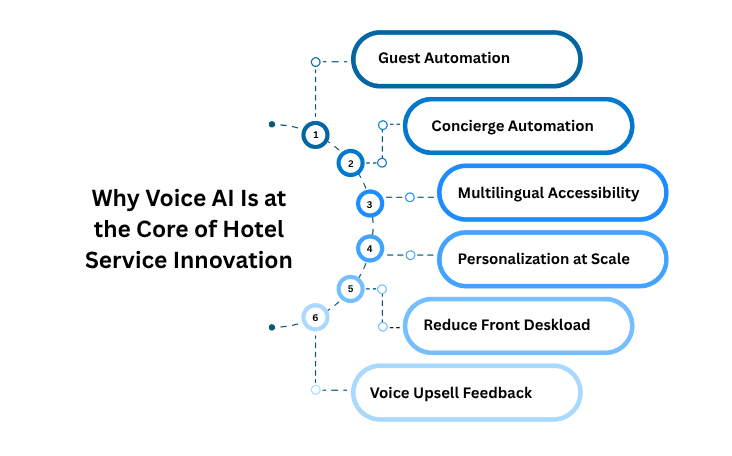Learn how AI-powered voice tech and agents enhance hotel customer service, delivering personalized experiences and improving operational efficiency.

Akshat Mandloi
Updated on
January 27, 2026 at 5:04 PM

Across the hospitality sector, guest expectations have evolved faster than most hotel systems can keep up with. Travelers now demand seamless, 24/7 service—delivered with a personal touch, in their preferred language, and without friction. For hoteliers, that means rethinking traditional guest interactions and turning to smarter, scalable technologies that can meet these rising demands.
Artificial Intelligence is no longer a concept reserved for tech conferences or experimental pilot programs. It's here—and it's increasingly integral to hotel operations. According to a 2024 industry report, over one-third of hoteliers now allocate 10–25% of their IT budgets to AI, a figure that’s expected to rise as automation becomes essential to maintaining competitive service standards.
Among all AI-powered upgrades, voice technology stands out as one of the most transformative. Real-time, multilingual voice agents are helping hotels streamline operations, personalize service at scale, and reduce the burden on frontline staff, without compromising the guest experience.
Voice is no longer just a convenience; it’s quickly becoming the new front desk.
TL;DR – Key Takeaways for Hospitality Leaders
Voice AI is becoming the new front desk: Hotels are replacing repetitive front-desk interactions with emotionally intelligent, real-time voice agents, cutting wait times and freeing up staff.
Multilingual voice automation is now essential: Smart hotels serve global guests with AI agents that speak 16+ languages, handle local accents, and deliver 24/7 personalized support.
Speed matters—<100ms or bust: Laggy bots kill trust. Hotels adopting sub-100ms voice AI are reporting up to 80% automation rates for common service tasks.
Smart upselling is now voice-driven: AI can surface late checkout, upgrades, or spa offers in context, boosting revenue while enhancing guest experience.
Seamless integration is non-negotiable: The best voice AI platforms plug into your PMS, CRM, and telephony stack without long deployments or custom dev work.
Why Voice AI Is at the Core of Hotel Service Innovation

Voice technology isn't just about novelty—it solves real, daily problems for hospitality teams. Unlike chatbots or apps that require a screen, voice AI provides a hands-free, natural interface that mirrors the way guests already interact with hotel staff. And unlike traditional IVRs or scripted bots, modern voice agents can understand nuance, respond in real time, and adapt their tone based on the conversation.
Here’s how hotels are using voice AI to transform service delivery:
Automated Check-Ins & Guest Support
Guests can confirm bookings, check in, or get directions to their room just by speaking. Voice agents handle common questions instantly, reducing wait times and freeing up human staff for more complex needs.Room Service & Concierge Requests
From ordering a late-night meal to asking for extra towels, voice assistants enable fast, natural interactions. With direct system integration, requests are logged and fulfilled automatically.Multilingual Accessibility
Hospitality is global—and so are your guests. Voice AI that understands 16+ languages and dialects removes language barriers and ensures every guest feels understood.Personalization at Scale
Modern voice agents can reference past guest preferences, suggest upgrades, or offer local recommendations, creating a more personalized experience without additional staff overhead.Front Desk Load Reduction
A significant portion of front-desk inquiries are repetitive. Voice AI handles these instantly, reducing pressure during peak check-in hours or late-night shifts.Voice-Based Upselling & Feedback Collection
Want to offer a late check-out or a room upgrade? Voice agents can surface offers in real-time based on guest behavior, and even capture feedback at checkout, giving management instant insight.
In short, voice AI is becoming central to the way modern hotels serve guests: faster, more efficiently, and with a human-like touch.
[ Also Read: Best AI Voice Changers in 2025: The Ultimate Guide. ]
Smallest.ai for Hospitality: Real-Time Voice AI That Feels Human
At Smallest.ai, we specialize in voice-first AI systems designed specifically for service industries—hospitality above all. Our mission is to help hotels deliver consistently exceptional guest experiences using conversational voice agents that sound natural, respond instantly, and scale with your property’s needs.
Unlike traditional bots or static IVR menus, our AI is context-aware, emotionally responsive, and trained for real-world hotel operations. Whether you’re managing a boutique resort or a multi-property chain, our platform adapts to your workflows without the need for costly system overhauls.
Smallest.ai voice agents deliver:
Ultra-fast response times under 100ms
Conversations feel fluid and human, not delayed or robotic.16+ supported languages and dialects
Serve global guests with native-level fluency and cultural nuance.Emotionally expressive voices
Our agents aren’t monotone—they sound warm, polite, and professional.End-to-end interaction coverage
Automate everything from check-ins and concierge support to room service and post-stay feedback.Enterprise-grade security
We’re fully compliant with SOC 2 Type 2, HIPAA, and PCI-DSS—protecting guest data at every step.Easy integration
Our developer-friendly SDKs and REST APIs make it simple to connect Smallest.ai to your hotel’s systems—whether it’s a PMS, CRM, or telephony backend.
Book a personalized demo and see how Smallest.ai can help your property deliver next-generation service today.
Use Cases: How Hotels Are Leveraging AI for Better Service
Today’s guests value speed, simplicity, and personalization—and AI is helping hotels deliver on all three fronts. While many hospitality brands have adopted automation, the real opportunity lies in applying these tools with purpose: to remove friction, reduce staff load, and elevate the guest experience.
Below are three hotel AI customer service case studies that illustrate how AI-driven service—especially voice-enabled automation—is already making an impact.
CitizenM – Self-Service Meets Smart Automation
CitizenM, a pioneer in modern hospitality, introduced self-check-in kiosks and in-room tablets to streamline operations across its properties. Guests can check in within 60 seconds, manage room preferences, and even control lighting and entertainment from a single device, without needing to contact the front desk.
Relevance:
While CitizenM focuses on screen-based automation, this model lays the groundwork for a voice-first experience. Imagine replacing tablet interactions with natural, spoken requests—no tapping or navigating menus—just "Turn off the lights" or "Can I get a late checkout?" Voice AI makes the process even more seamless, especially for international travelers or guests with accessibility needs.
Yotel’s Yobot – Contactless Convenience
Yotel’s signature robotic luggage handler, Yobot, automates baggage storage for arriving guests in New York. Enclosed in glass and powered by barcode tech, Yobot offers a novel, hands-off experience that appeals to tech-savvy travelers looking for efficiency over formality.
Relevance:
Robotics like Yobot underscore a broader expectation: guests are open to non-human interactions—if they’re fast, useful, and easy. That’s exactly what voice AI delivers. Guests want to speak their request and know it’s being handled—no queues, no wait, and no need to repeat themselves.
What Hotels Should Look for in a Voice AI Solution
As guest-facing AI becomes more mainstream, not all solutions are created equal, especially when it comes to voice technology. For hospitality leaders considering voice AI, the right platform must do more than just “talk back.” It should deliver speed, emotional intelligence, and operational reliability—at scale.
Here’s what to prioritize when evaluating voice AI for your hotel or resort:
1. Real-Time Response (Under 100ms)
Latency matters. Guests expect natural, uninterrupted conversations—just like they’d have with your front desk staff. A delay of even one second can make an interaction feel robotic or frustrating.
What to look for:
Voice agents that respond instantly—within 100 milliseconds—to maintain a conversational rhythm and reduce cognitive friction.
2. Lifelike, Emotionally Expressive Voices
Tone and warmth are non-negotiable in hospitality. Flat or monotone bots may answer questions, but they can’t build trust or make guests feel welcome.
What to look for:
AI voices that can vary tone, show empathy, and adapt based on context, whether responding to a complaint or offering a room upgrade.
3. Multilingual & Accent-Aware Capabilities
Today’s travelers speak dozens of languages and expect to be understood clearly, especially in moments of need.
What to look for:
Support for multiple languages and regional accents, plus the ability to switch contextually when needed (e.g., mid-conversation translation or clarification).
4. Seamless System Integration
Voice AI should work with what you already use, not require you to replace it. Compatibility with PMS, CRM, telephony, and housekeeping systems is critical.
What to look for:
Flexible SDKs and REST APIs that allow for quick integration and easy updates as your tech stack evolves.
5. Scalability During Peak Seasons
Your voice assistant must handle both the quiet midweek and the fully booked holiday weekend, without dropping calls or slowing down.
What to look for:
A solution designed to manage thousands of concurrent interactions, dynamically scaling without performance dips.
6. Enterprise-Grade Security & Compliance
With sensitive guest data on the line, your AI provider must meet the highest standards for data privacy and regulatory compliance.
What to look for:
Certifications like SOC 2 Type 2, HIPAA, PCI-DSS, and tools for data anonymization, encryption, and access control.
These aren’t just technical checkboxes—they’re the foundation of a voice experience that reflects your hotel’s brand values. The right voice AI should feel less like software and more like a trusted extension of your team.
Conclusion
The hospitality industry is entering a new era—one where fast, personalized, and multilingual service is no longer a differentiator, but an expectation. As digital-native travelers seek seamless experiences and operational costs continue to rise, hotels must evolve beyond traditional service models.
Voice AI is not just part of this transformation—it’s leading it.
From late-night room service calls to multilingual check-in assistance, voice technology is proving to be one of the most intuitive, scalable, and human ways to enhance guest interactions. It empowers staff, improves efficiency, and ensures that every guest—no matter where they’re from or when they arrive—feels heard and cared for.
Hotels that invest in smart voice solutions today won’t just meet expectations—they’ll exceed them. They’ll build loyalty through consistency, deliver service at scale, and create memorable experiences that drive positive reviews, repeat stays, and long-term growth.
At Smallest.ai, we help hospitality brands deliver this promise—one conversation at a time.
Ready to bring AI voice to your hotel?
Book a demo and discover how Smallest.ai can automate guest interactions, reduce front-desk pressure, and elevate the way you serve.
FAQs – Voice AI in Hospitality
1. How secure is AI-powered guest interaction?
Very secure—if the provider follows enterprise-grade standards. At Smallest.ai, we adhere to SOC 2 Type 2, HIPAA, and PCI-DSS frameworks. Data is encrypted at every layer, with strict controls around access and anonymization. Security isn’t an afterthought—it’s foundational.
2. Can voice AI handle multiple languages and accents?
Yes. Our system is trained to support 16+ global languages and dialects, with the ability to understand and respond naturally to regional accents. Whether a guest speaks Spanish, Mandarin, French, or Arabic, the voice agent responds in a fluent, culturally appropriate manner.
3. Are AI tools in hotels secure and compliant with data regulations?
Yes, if implemented correctly. Leading providers like smallest.ai ensure compliance with standards like GDPR, CCPA, HIPAA, and PCI-DSS. Always verify that any AI vendor offers encryption, data anonymization, and access controls to protect guest information.
4. How quickly can a voice AI solution be deployed?
Most hotels can be live in under two weeks. With easy integration options (via SDKs, APIs, or telephony connectors), you don’t need to overhaul your existing systems. We work closely with your team to train, test, and optimize the voice agent for your workflows.
5. Is AI too expensive for small or boutique hotels?
Not necessarily. Many AI solutions, including those from providers like Smallest.ai, offer scalable, cost-effective options. Smaller hotels can adopt AI incrementally, starting with areas like voice-based reservation handling or automated feedback collection.
6. Can voice AI help with upselling or feedback?
Yes. Smart voice agents can suggest upgrades, late check-outs, or dining packages based on guest profiles or real-time context. They can also capture structured and unstructured feedback post-stay, giving you actionable insights while guests’ impressions are fresh.

Automate your Contact Centers with Us
Experience fast latency, strong security, and unlimited speech generation.
Automate Now


